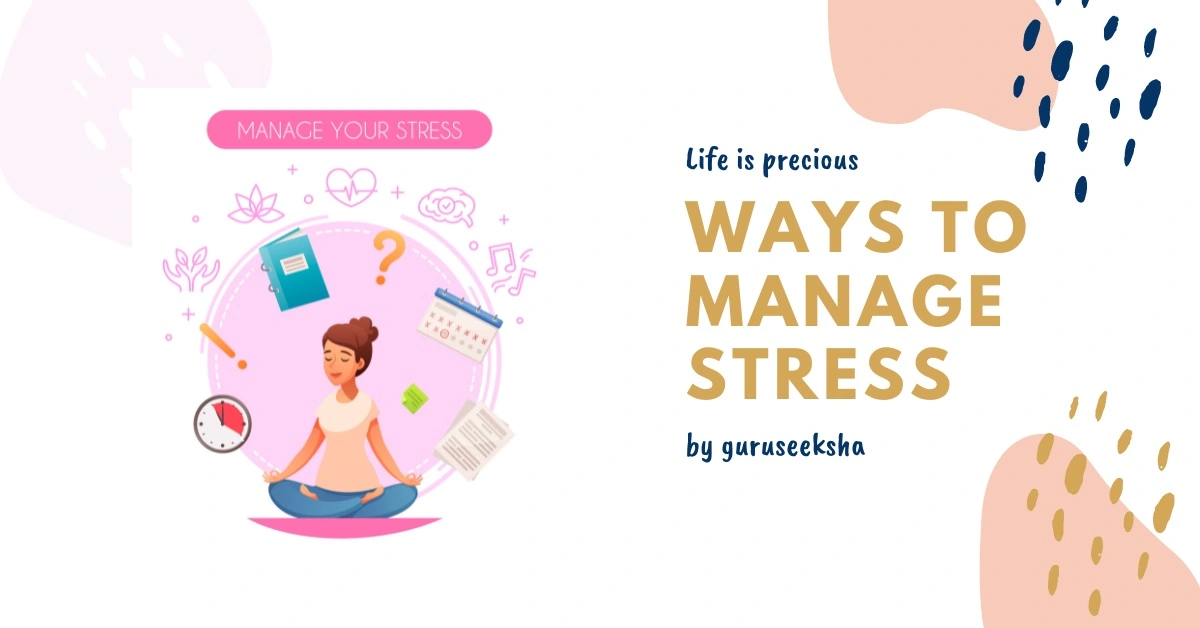Problems of stress and anxiety are increasing among college students. Thus best stress management strategies become essential in this scenario.
According to the Anxiety and Depression Association of America, 80% of college students experience stress frequently or sometimes on a daily basis.
Stress is also one of the factors that cause one in three students to underperform academically. College students can develop coping strategies to combat stressors and improve their school experience.
When you experience a stressful emotion, your adrenal glands release epinephrine (the hormone responsible for the flight or fight response) and then cortisol.
In dangerous situations, this reaction can save your life. However, too much cortisol can have long-term negative effects on metabolic rate, memory formation, and blood sugar regulation.
Types of stress
Stress can take one of three forms:
Acute stress:
Acute stress, the most common form of stress, is the result of everyday stressors such as staying up late, running to class or performing poorly. Fortunately, most acute stresses pass quickly and have little to no psychological or physical impact.
Episodic Acute Stress:
As the name suggests, episodic acute stress occurs when a student experiences multiple acute stress episodes over an extended period of time. Common symptoms are migraines and tension headaches.
Chronic Acute Stress:
Chronic acute stress occurs when someone is unable to avoid long-term stressful situations. It can develop and lead to weight gain, sleep deprivation, and anxiety.
What causes stress in Students?
According to the American College Health Association (ACHA), 44.9% of college students experience above-average levels of stress, and 12.7% have overwhelming levels of stress.
With so many academic demands and responsibilities as a student, you can experience high-stress levels at times. However, if anxiety is interfering with your daily life, you need to know what causes it and how to deal with it.
These are some of the most common causes of stress in college students.
Living away from home
The transition from high school to college is exciting for many students living away from home for the first time. However, with independence comes new responsibilities, making you accountable for your actions.
Adapting to a new environment and learning how to take care of yourself can be challenging. It is normal for students to feel sad and stressed when they learn how far they are from the support system of family and friends.
Financial difficulties
Rising college costs are a major source of stress for many low-income families and students who attend school alongside their jobs. One study found that 70% of college students suffered from financial stress.
This stress comes from figuring out how to manage college expenses, including tuition, textbooks, meal plans, and general expenses, in addition to the full course load. For many students, this added stress makes them more likely to drop out of school.
Academic pressure
One of the most common reasons to create stress during college life is academic performance. It puts a lot of pressure on a student’s academic performance and can have a negative impact on their mental health.
This pressure can come from maintaining certain grades to get a scholarship, and not wanting to disappoint your parents or personal expectations.
Unmanaged academic stress can lead to mental health issues such as anxiety, depression, substance use, burnout, and poor health and well-being.
Conflict with roommate
Some colleges offer the option of choosing a private room in a dormitory, but most schools only offer shared dormitories.
Gathering a group of strangers in a small space can easily create tension and conflict if individuals do not get along or befriend each other.
Relationship questions
A college is a great place for students to forge new relationships while maintaining relationships that existed before they left school. Connecting with family, friends, and partners can be a great stress reliever.
But when these connections go awry, students can experience a great deal of stress and anxiety. It’s important to recognize: Stressful relationships can affect academic performance and mental health if healthy solutions are not found.
Schedule after completion
Thinking about what to do next as students prepare for graduation is common, but it can also be stressful and scary. Post-Graduation Stress Disorder can leave you emotionally and mentally drained when making decisions about the next chapter of your life.
It can be daunting to think about taking your first steps into the world of stress. It is important for students dealing with this kind of stress to find coping mechanisms before symptoms worsen.
Ways to manage stress for college students
Long-term stress can be harmful if not managed. It affects not only your physical and mental health but also your grades and relationships.
Recognizing and understanding where your stress is coming from can help you manage it better. Consider these 12 ways to manage stress when you’re feeling anxious or overwhelmed.
- Get enough rest and sleep
The American Psychological Association says good sleep helps the brain recharge, repair muscles, promote memory consolidation, and strengthen the immune system. In fact, 21% of adults feel stressed because they don’t get enough sleep.
Thus getting good sleep becomes one of the very important way to manage stress for college students.
Many college students stay up all night studying for exams, but this kind of habit can lead to a lack of sleep and insomnia. Depriving your body of sleep can affect cognitive function, academic performance, and mental health.
If you’re having trouble sleeping at night, try avoiding too much caffeine, turning down the lights, and putting technology away for at least an hour before going to bed.
- Focus on health and nutrition
When we think of college weight gain, we usually think of “15th grade.” However, it’s not necessarily true that he gains 15 pounds in his freshman year.
According to Harvard Medical School, stress can decrease appetite by releasing corticotropin-releasing hormone and increase appetite by releasing cortisol.
Given the freedom to choose what and when to combine academic stress, college students are more likely to deal with overeating or overeating.
Good habits such as a balanced diet, regular exercise, and adequate sleep can help manage stress and prevent dramatic weight loss or gain.
- Be Active
The Mayo Clinic suggests that regular exercise can improve overall health and reduce stress. Exercise can also help reduce fatigue, improve mental clarity, and improve cognitive function.
After physical activity, the brain produces feel-good neurotransmitters called endorphins, which act as natural pain relievers.
Relaxation strategies consisting of yoga practices, meditation, acupuncture, massage therapy, and deep respiration also can produce endorphins.
If you’re having trouble motivating yourself to stay active, ask a friend to change your routine or work out in shorter intervals.
If you could just add 15 minutes of physical activity to your daily routine, you can drastically observe its positive influence on physical and mental health.
- Use stress relief outlets
Having a healthy outlet to rely on during stressful times can help calm the mind and clarify how to move forward in stressful situations. Hobbies, social clubs, and exercise are all stress-relieving outlets along with being the best ways to manage stress.
- Find connections
There are many advantages to having a support system during studying abroad. The personal connection provides stress-relieving hormones that counteract the body’s fight-or-flight response. Surrounding yourself with people you trust makes you feel safe and calm.
College is a great place to make new friends. Joining clubs and organizations, talking to classmates, volunteering, and participating in school sports teams can help you make connections on and off campus.
- Practice self-care
Stress causes tension in the body through muscle stiffness and pain, headaches, and a weakened immune system. Taking time out of your busy schedule and prioritizing self-care can help relieve tension and stress. It’s just a small part with great impact.
- Manage your time effectively
Ineffective time management can cause a lot of stress to students. Nearly 87% of college students say their time management skills improve their grades in class. When you first experience college life, you may be tempted to choose social life over academics.
Developing a time management strategy can help you stay organized and prioritize your most important tasks. Writing out upcoming assignments and exams in your planner or on your phone helps you know what’s coming next and prioritize your time.
If he knows he needs to study or complete a task, he can plan his day accordingly. Effective time management can improve academic performance, help you stay organized, and reduce stress and anxiety.
- Tide up
With a jam-packed schedule of classes, homework, extracurricular activities, and social activities, it can seem overwhelming to keep track of everything.
However, a lack of organizational skills will only add stress and pressure. Unorganized students typically have lower academic success rates than organized students.
It’s important to find ways to stay organized before the task piles up. Calendars and planners are valuable organizational tools. Try to keep your living and working spaces neat and organized to reduce distractions and anxiety.
- Practice positive thinking
Research has shown that practicing positive thinking during times of stress has many benefits. Positive thoughts improve physical health and clear the mind.
If you find yourself thinking negative thoughts, counteract them by encouraging yourself to be positive. Positive reinforcement during stress can reduce the likelihood of developing chronic stress.
- Try Mindfulness Exercises
College students are busy and constantly distracted, making it difficult to stay focused in the moment. Mindfulness helps drown out background noise and increase awareness.
Meditation is a great way to practice mindfulness, but you can also incorporate it into your daily activities. Not only does this improve memory and concentration, it is also a beneficial way to reduce stress.
- Start journaling
Journaling is highly therapeutic and stress relieving. Write down your daily thoughts and feelings or keep a diary whenever you get some free time.
Write down how you were feeling in various situations. what was the condition of your thoughts and emotions? How did you react in those situations?
Make an observation of how did you react and why did you react? It may seem to be simple but believe me, it works like magic to release your stress and is one of the best ways to manage stress.
This kind of self-reflection can help you spot regular patterns of stress in your life and examine how you are coping with them. This allows you to put things in perspective, so you can effectively manage these stressors.
- Don’t be afraid to ask for help
Seek help before you stress. Check out the mental health resources your school offers or take the time to talk to a professional. A mental health professional can help you identify your stress triggers, create a mental health plan, and develop strategies for managing stress in a healthy way.
Final words,
It’s important to remember that stress is not the same for everyone. You might need to go through trial and error to figure out what stress management strategy works.
As a starting point, I encourage you to take care of yourself physically and emotionally and try different stress management strategies then find what works best for you to reduce your stress.
It’s important to seek help when stress and anxiety weigh on you and make your daily life difficult. Many schools offer helpful resources, such as in-person and online mental health services.
You can start by talking to your school counselor or college counselor about the stress you are dealing with. You can also talk to your parents, someone you trust, or your doctor.



